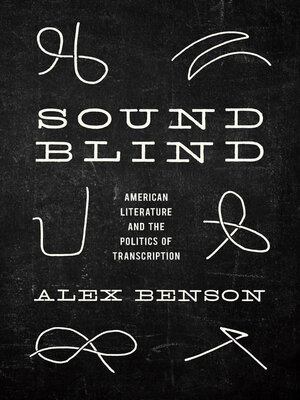
Sign up to save your library
With an OverDrive account, you can save your favorite libraries for at-a-glance information about availability. Find out more about OverDrive accounts.
Find this title in Libby, the library reading app by OverDrive.



Search for a digital library with this title
Title found at these libraries:
| Library Name | Distance |
|---|---|
| Loading... |
In the 1880s, a new medical term flashed briefly into public awareness in the United States. Children who had trouble distinguishing between similar speech sounds were said to suffer from “sound-blindness.” The term is now best remembered through anthropologist Franz Boas, whose work deeply influenced the way we talk about cultural difference. In this fascinating work of literary and cultural history, Alex Benson takes the concept as an opening onto other stories of listening, writing, and power—stories that expand our sense of how a syllable, a word, a gesture, or a song can be put into print, and why it matters.
Benson interweaves ethnographies, memoirs, local-color stories, modernist novels, silent film scripts, and more. Taken together, these seemingly disparate texts—by writers including John M. Oskison, Helen Keller, W. E. B. Du Bois, F. Scott Fitzgerald, and Elsie Clews Parsons—show that the act of transcription, never neutral, is conditioned by the histories of race, land, and ability. By carefully tracing these conditions, Benson argues, we can tease out much that has been left off the record in narratives of American nationhood and American literature.
Benson interweaves ethnographies, memoirs, local-color stories, modernist novels, silent film scripts, and more. Taken together, these seemingly disparate texts—by writers including John M. Oskison, Helen Keller, W. E. B. Du Bois, F. Scott Fitzgerald, and Elsie Clews Parsons—show that the act of transcription, never neutral, is conditioned by the histories of race, land, and ability. By carefully tracing these conditions, Benson argues, we can tease out much that has been left off the record in narratives of American nationhood and American literature.







